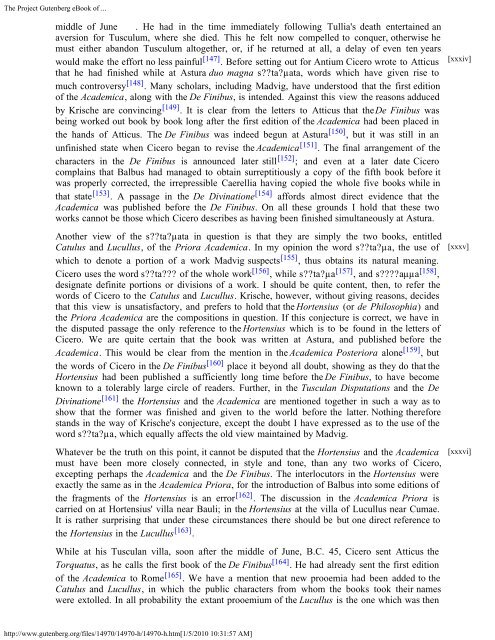academica of cicero. - 912 Freedom Library
academica of cicero. - 912 Freedom Library
academica of cicero. - 912 Freedom Library
Create successful ePaper yourself
Turn your PDF publications into a flip-book with our unique Google optimized e-Paper software.
The Project Gutenberg eBook <strong>of</strong> ...<br />
middle <strong>of</strong> June . He had in the time immediately following Tullia's death entertained an<br />
aversion for Tusculum, where she died. This he felt now compelled to conquer, otherwise he<br />
must either abandon Tusculum altogether, or, if he returned at all, a delay <strong>of</strong> even ten years<br />
would make the effort no less painful [147] . Before setting out for Antium Cicero wrote to Atticus<br />
that he had finished while at Astura duo magna s??ta?µata, words which have given rise to<br />
much controversy [148] . Many scholars, including Madvig, have understood that the first edition<br />
<strong>of</strong> the Academica, along with the De Finibus, is intended. Against this view the reasons adduced<br />
by Krische are convincing [149] . It is clear from the letters to Atticus that the De Finibus was<br />
being worked out book by book long after the first edition <strong>of</strong> the Academica had been placed in<br />
the hands <strong>of</strong> Atticus. The De Finibus was indeed begun at Astura [150] , but it was still in an<br />
unfinished state when Cicero began to revise the Academica [151] . The final arrangement <strong>of</strong> the<br />
characters in the De Finibus is announced later still [152] ; and even at a later date Cicero<br />
complains that Balbus had managed to obtain surreptitiously a copy <strong>of</strong> the fifth book before it<br />
was properly corrected, the irrepressible Caerellia having copied the whole five books while in<br />
that state [153] . A passage in the De Divinatione [154] affords almost direct evidence that the<br />
Academica was published before the De Finibus. On all these grounds I hold that these two<br />
works cannot be those which Cicero describes as having been finished simultaneously at Astura.<br />
Another view <strong>of</strong> the s??ta?µata in question is that they are simply the two books, entitled<br />
Catulus and Lucullus, <strong>of</strong> the Priora Academica. In my opinion the word s??ta?µa, the use <strong>of</strong><br />
which to denote a portion <strong>of</strong> a work Madvig suspects [155] , thus obtains its natural meaning.<br />
Cicero uses the word s??ta??? <strong>of</strong> the whole work [156] , while s??ta?µa [157] , and s????aµµa [158] ,<br />
designate definite portions or divisions <strong>of</strong> a work. I should be quite content, then, to refer the<br />
words <strong>of</strong> Cicero to the Catulus and Lucullus. Krische, however, without giving reasons, decides<br />
that this view is unsatisfactory, and prefers to hold that the Hortensius (or de Philosophia) and<br />
the Priora Academica are the compositions in question. If this conjecture is correct, we have in<br />
the disputed passage the only reference to the Hortensius which is to be found in the letters <strong>of</strong><br />
Cicero. We are quite certain that the book was written at Astura, and published before the<br />
Academica. This would be clear from the mention in the Academica Posteriora alone [159] , but<br />
the words <strong>of</strong> Cicero in the De Finibus [160] place it beyond all doubt, showing as they do that the<br />
Hortensius had been published a sufficiently long time before the De Finibus, to have become<br />
known to a tolerably large circle <strong>of</strong> readers. Further, in the Tusculan Disputations and the De<br />
Divinatione [161] the Hortensius and the Academica are mentioned together in such a way as to<br />
show that the former was finished and given to the world before the latter. Nothing therefore<br />
stands in the way <strong>of</strong> Krische's conjecture, except the doubt I have expressed as to the use <strong>of</strong> the<br />
word s??ta?µa, which equally affects the old view maintained by Madvig.<br />
Whatever be the truth on this point, it cannot be disputed that the Hortensius and the Academica<br />
must have been more closely connected, in style and tone, than any two works <strong>of</strong> Cicero,<br />
excepting perhaps the Academica and the De Finibus. The interlocutors in the Hortensius were<br />
exactly the same as in the Academica Priora, for the introduction <strong>of</strong> Balbus into some editions <strong>of</strong><br />
the fragments <strong>of</strong> the Hortensius is an error [162] . The discussion in the Academica Priora is<br />
carried on at Hortensius' villa near Bauli; in the Hortensius at the villa <strong>of</strong> Lucullus near Cumae.<br />
It is rather surprising that under these circumstances there should be but one direct reference to<br />
the Hortensius in the Lucullus [163] .<br />
While at his Tusculan villa, soon after the middle <strong>of</strong> June, B.C. 45, Cicero sent Atticus the<br />
Torquatus, as he calls the first book <strong>of</strong> the De Finibus [164] . He had already sent the first edition<br />
<strong>of</strong> the Academica to Rome [165] . We have a mention that new prooemia had been added to the<br />
Catulus and Lucullus, in which the public characters from whom the books took their names<br />
were extolled. In all probability the extant prooemium <strong>of</strong> the Lucullus is the one which was then<br />
http://www.gutenberg.org/files/14970/14970-h/14970-h.htm[1/5/2010 10:31:57 AM]<br />
[xxxiv]<br />
[xxxv]<br />
[xxxvi]















